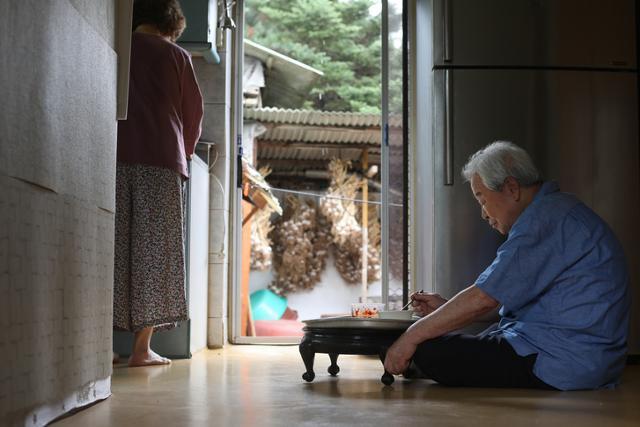Subsidies needed to address poverty among older adults: lawmaker
By Shin Ji-hyePublished : Oct. 7, 2021 - 15:31

More government support is required to address poverty among the nation’s older adults, a lawmaker said Thursday.
According to the most recent data from Statistics Korea revealed by Rep. Ko Young-in of the Democratic Party, the poverty rate for people aged 66 and older was 45 percent in 2019 as compared with 10.72 percent for people under 66.
When the nation’s population was divided into 10 income brackets, almost half of senior citizens were in the bottom two, with 29.42 percent of the elderly in the lowest decile and 17.56 percent in the next-lowest decile, the data showed.
The average disposable monthly income for households in the bottom decile was 640,000 won ($538), including government subsidies, and for the second decile it was 1.1 million won.
The poverty rate for older people was more than four times higher than that for other age groups, the data showed.
According to comparative data on elderly poverty rates among major countries in the Organization for Economic Cooperation and Development, France, Germany and Sweden significantly lowered their rates after providing government subsidies but the corresponding figure for South Korea has not changed much.
This is because subsidies for older adults in Korea are so tiny that they have failed to lift recipients out of poverty, Rep. Ko said.
“Due to small government subsidies, the elderly poverty rate continues to be No. 1 in the OECD,” he said.
Ko also pointed out that older people on social assistance often have their pensions clawed back so the actual amount of support they receive is minimal.
In Korea people whose income and assets fall below a certain level qualify for basic livelihood support of 530,000 won per month, regardless of age, and people aged 60 or older in the bottom 70 percent income bracket qualify for a basic pension of 300,000 won per month. However, if a person’s income exceeds 500,000 won per month, including subsidies, the government cuts off the pension payments.
This means that around 433,000 poor people who would otherwise qualify for basic pension payments do not receive them. Pension clawbacks affect 90 percent of basic livelihood recipients aged 65 and older, the data showed.
Rep. Ko called on the government to pay 100 percent of the basic pension to seniors and review a step-by-step increase of 100,000 won.
“Solving the most serious economic polarization problem in our society should begin by lowering the elderly poverty rate to around 10 percent from 45 percent,” he said.
According to the most recent data from Statistics Korea revealed by Rep. Ko Young-in of the Democratic Party, the poverty rate for people aged 66 and older was 45 percent in 2019 as compared with 10.72 percent for people under 66.
When the nation’s population was divided into 10 income brackets, almost half of senior citizens were in the bottom two, with 29.42 percent of the elderly in the lowest decile and 17.56 percent in the next-lowest decile, the data showed.
The average disposable monthly income for households in the bottom decile was 640,000 won ($538), including government subsidies, and for the second decile it was 1.1 million won.
The poverty rate for older people was more than four times higher than that for other age groups, the data showed.
According to comparative data on elderly poverty rates among major countries in the Organization for Economic Cooperation and Development, France, Germany and Sweden significantly lowered their rates after providing government subsidies but the corresponding figure for South Korea has not changed much.
This is because subsidies for older adults in Korea are so tiny that they have failed to lift recipients out of poverty, Rep. Ko said.
“Due to small government subsidies, the elderly poverty rate continues to be No. 1 in the OECD,” he said.
Ko also pointed out that older people on social assistance often have their pensions clawed back so the actual amount of support they receive is minimal.
In Korea people whose income and assets fall below a certain level qualify for basic livelihood support of 530,000 won per month, regardless of age, and people aged 60 or older in the bottom 70 percent income bracket qualify for a basic pension of 300,000 won per month. However, if a person’s income exceeds 500,000 won per month, including subsidies, the government cuts off the pension payments.
This means that around 433,000 poor people who would otherwise qualify for basic pension payments do not receive them. Pension clawbacks affect 90 percent of basic livelihood recipients aged 65 and older, the data showed.
Rep. Ko called on the government to pay 100 percent of the basic pension to seniors and review a step-by-step increase of 100,000 won.
“Solving the most serious economic polarization problem in our society should begin by lowering the elderly poverty rate to around 10 percent from 45 percent,” he said.







![[Graphic News] More Koreans say they plan long-distance trips this year](http://res.heraldm.com/phpwas/restmb_idxmake.php?idx=644&simg=/content/image/2024/04/17/20240417050828_0.gif&u=)
![[KH Explains] Hyundai's full hybrid edge to pay off amid slow transition to pure EVs](http://res.heraldm.com/phpwas/restmb_idxmake.php?idx=644&simg=/content/image/2024/04/18/20240418050645_0.jpg&u=20240419100350)






![[From the Scene] Monks, Buddhists hail return of remains of Buddhas](http://res.heraldm.com/phpwas/restmb_idxmake.php?idx=652&simg=/content/image/2024/04/19/20240419050617_0.jpg&u=20240419175937)

![[KH Explains] Hyundai's full hybrid edge to pay off amid slow transition to pure EVs](http://res.heraldm.com/phpwas/restmb_idxmake.php?idx=652&simg=/content/image/2024/04/18/20240418050645_0.jpg&u=20240419100350)

![[Today’s K-pop] Illit drops debut single remix](http://res.heraldm.com/phpwas/restmb_idxmake.php?idx=642&simg=/content/image/2024/04/19/20240419050612_0.jpg&u=)